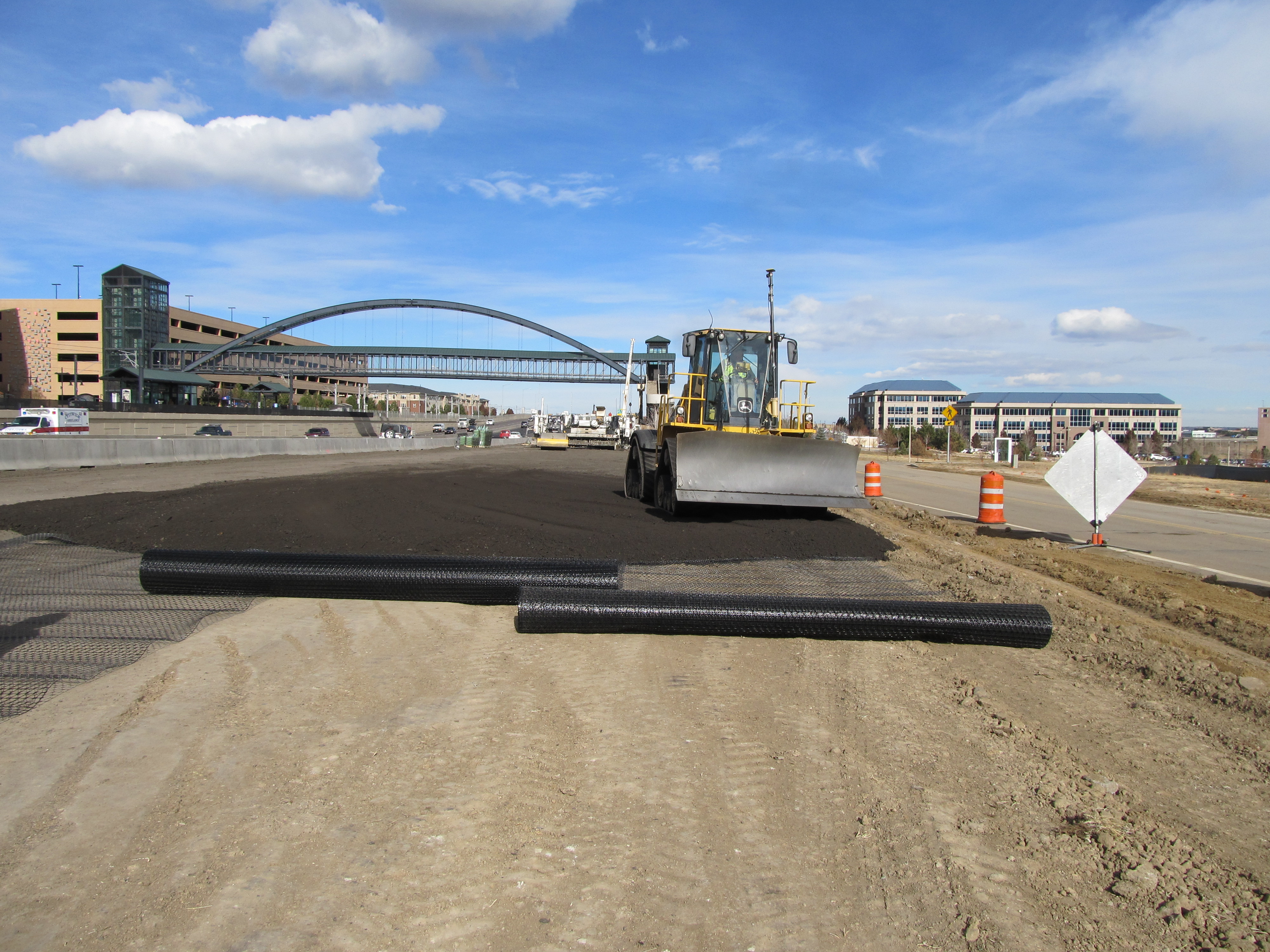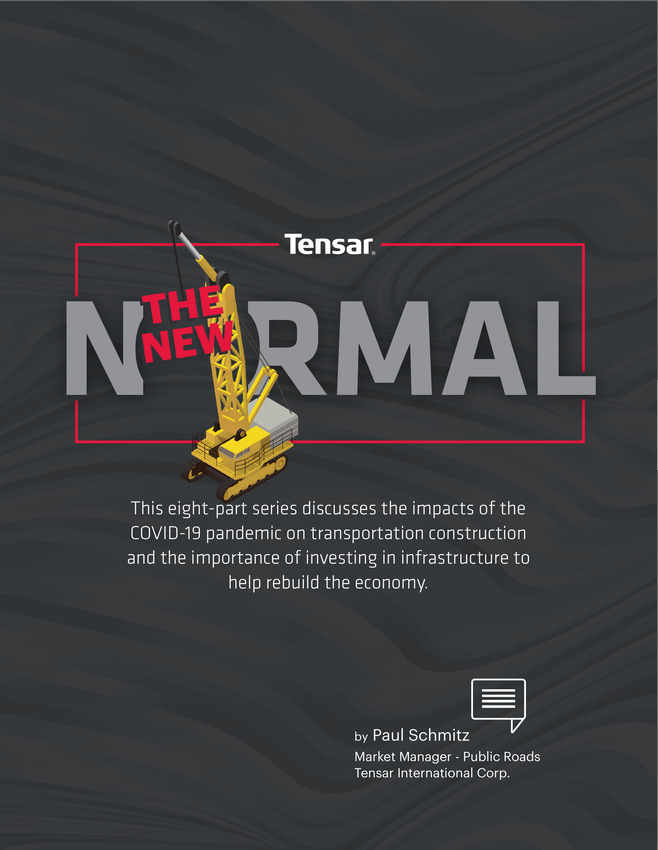Part 2: COVID-19 and Transportation Construction - Direct Impacts to Projects
by Paul Schmitz, on June 11, 2020
 How has the “new normal” directly impacted public transportation projects? What hurdles are being encountered on job sites and have any new design approaches emerged as a result of COVID-19? We asked our expert panel from top engineering and construction firms, suppliers and state agencies to share their perspectives. Below are just a few responses we received; however, the full discussion can be found in our ebook, "The New Normal."
How has the “new normal” directly impacted public transportation projects? What hurdles are being encountered on job sites and have any new design approaches emerged as a result of COVID-19? We asked our expert panel from top engineering and construction firms, suppliers and state agencies to share their perspectives. Below are just a few responses we received; however, the full discussion can be found in our ebook, "The New Normal."
Have you seen any impacts to supply chain when dealing with suppliers or subcontractors?
- Nick DiBartolo – (Vice President - Rogers Group, Inc.) We have the same problem as everyone related to the industrial hygiene sector, but for the most part, our chain remains unbroken. We have been served a few notices of the potential for delays due to COVID-19 from some subs, but for the most part this appears to be a cautionary move to protect claimant rights in line with the construction contract.
- James Bailey (Senior Vice President – Skanska USA Civil) We have seen very limited impact to the supply chain on our projects. We have seen some impacts to specialized items coming from Italy and other impacted areas.
Do you anticipate an increased usage of delivery methods such as design/build and/or PPP to construct projects associated with a potential infrastructure stimulus package?
- Steve Eckhart – (Central Area Director – Tensar) We are seeing an increased level of interest in value-engineering proposals. Due to the economic impacts of COVID-19, most private and public customers are experiencing budget shortfalls due to cuts in capital expenditures and to a loss of tax revenue. This current reality has increased the receptivity to the unique solutions we have offered that provide a higher level of performance at lower costs. Our history of success with subgrade stabilization and pavement optimization coupled with the economic benefit our solutions offer is gaining traction in the private and public markets.
- Randell Iwasaki – (Executive Director - Contra Costa Transportation Authority) As a local agency, our options are limited as we don’t have the authority to use Design/Build, and the State of California has allowed the P3 authority to lapse. However, the Contra Costa Transportation Authority Board (CCTA) just approved the use of Construction Manager/General Contractor (CM/GC) delivery method for a cable-stayed bridge within the City of San Ramon. We worked with our state Assembly Member Bauer-Kahan to write the legislation that would allow local agencies like ours to use CM/GC for projects not on the State Highway System. Currently, using an alternative delivery method like CM/GC on the State Highway System in California requires you to use the California Department of Transportation for inspection.
- Michael Mangione (Senior Vice President – WSP USA) States and transportation/toll agencies are realizing negative revenue impacts and the length of recovery will be dictated by the amount of revenue lost. If a federal stimulus bill provides increased funding, some states may take advantage of design-build to deliver projects. Others may also trend toward other alternate delivery methods such as CMGC or progressive design-build to speed delivery. P3s may also be attractive as funding is tight and the market historically values infrastructure projects as strong investments. States that do not currently allow P3s will be slow to initiate, if at all.
Are the impacts from the CVD-19 pandemic changing interest/approval of value-engineering proposals and if so, why?
- Nick DiBartolo – (Vice President - Rogers Group, Inc.) While we have yet to see this directly, I would imagine that any reasonable proposal would get serious consideration. Depending on your state/locale, more than half of an entity's revenue could be derived from sales tax. When the economy is shut down, there's obviously a tremendous reduction in operating income. Listening to and fairly evaluating VE proposals is just sound fiscal policy.
- Chris Carry (Vice President of Sitework - Mosser Construction, Inc.) We haven't necessarily seen this yet, however, I would assume as funding impacts are felt VE items will become far more relevant and also influential.
How has COVID-19 impacted transportation construction? We have the full discussion from our expert panelists, including lessons learned and preparation advice in our eBook, "The New Normal." This free resource shares all the insights we gathered covering these following key areas:
- Immediate and long-term implications for transportation construction
- Funding for public infrastructure
- Lessons learned
- Key takeaways and action steps to prepare for possible stimulus funding
Get Your Copy Now:
Topics:
- Flexible Pavement Road
- Rigid Pavement Road
- Public Roads
- Ports
- Railways
- Oil, Gas & Petrochemical
- Renewables
- Commercial & Industrial
- Airports
- Military
- Working Surfaces
- Rail Track
- Environmental Construction
- Haul Road
- Unpaved Road
- Concrete Pavers
- Parking Lot
- Subgrade Stabilization
- Asphalt Reinforcement
- Heavy Duty Roads & Surfaces
- Crane Pad Reinforcement
- ADD3 Capacity Improvement Systems
- InterAx
- TriAx
- BiAxial (BX)
- Uniaxial (UX)
- GlasGrid
- GlasPave
- Rapid Repair
- Mesa
- Olympia
- SierraScape
- Sierra Slope
- ARES
- Temporary Retaining Wall
- FilterGrid





